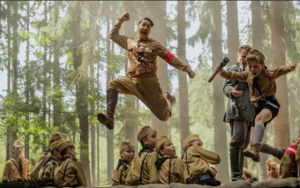JOJO RABBIT: 3 ½ STARS. “change is possible; there is much more to life than hate.”
 Taika Waititi’s “Jojo Rabbit,” based on the book “Caging Skies” by Christine Leunens, is an anti-hate satire pitched somewhere between “The Death of Stalin” and “Hogan’s Heroes.” The director of “Thor: Ragnarok” and “What We Do in the Shadows” takes some liberties with the book, even conjuring images of Adolph Hitler, but holds true to the book’s exploration of the dark heart of obsession.
Taika Waititi’s “Jojo Rabbit,” based on the book “Caging Skies” by Christine Leunens, is an anti-hate satire pitched somewhere between “The Death of Stalin” and “Hogan’s Heroes.” The director of “Thor: Ragnarok” and “What We Do in the Shadows” takes some liberties with the book, even conjuring images of Adolph Hitler, but holds true to the book’s exploration of the dark heart of obsession.
Set in World War II-era Germany, the movie stars newcomer Roman Griffin Davis as Jojo “Rabbit” Betzler a ten-year-old and member of his local Hitler Youth group. The youngster is discovering the world and making decisions about his place in it. That includes embracing Nazism and all its ugly ideology. “He’s a fanatic,” says his mother Rosie (Scarlett Johansson). “It took them three weeks to get over that his grandfather was not blonde.”
Jojo has even created an imaginary friend in the form of Adolph Hitler (Waititi) who provides the kind of encouragement his absent father isn’t able to. “You’re the bestest, nicest, most loyal little Nazi I’ve ever seen.”
What Jojo doesn’t know is that his mother is working with the Resistance and is hiding Elsa, a young Jewish girl (Thomasin McKenzie) in their attic. The discovery of Elsa makes Jojo confront his belief system and a set of feelings as he comes of age.
“Jojo Rabbit” is going to polarize people. Some will see a film that simply treats Nazis as goofy caricatures and not the malevolent force of evil they were/are. Others may be offended by the use of extreme racial stereotypes for satirical effect. Waititi takes no prisoners on either account although he ends the movie with a clear and uncut message from poet Rainer Maria Rilke that, for some, will bring everything into focus. “Let everything happen to you / Beauty and terror / Just keep going / No feeling is final.”
“Jojo Rabbit’s” exploration of the power of love’s ability to defeat fascism, no matter how farcical, is a powerful message, particularly in our increasingly cynical age. It’s an uneven film, indulgent at times, but between the laughs are some very effective moments.
As usual Waititi’s ear for music adds much to the experience. “Komm, gib mir deine Hand” the German language version of “I Want to Hold Your Hand” fills the soundtrack as images of Hitler Youth pumping their fists in the air fill the screen, providing a brilliant and subversive comparison of two kinds of fanaticism, Beatlemania and National Socialism. Later David Bowie’s “Helden” (“Heroes”) provides a sentimental blast as the final credits roll.
“Jojo Rabbit” isn’t simply an anti-hate movie as the ads say. More importantly, it’s a pro-love movie. The darkness inherent in the story is filtered through the experience of a ten-year grappling with concepts he simply doesn’t understand. Lonely and shy about a scar on his face (“He looks like a Picasso painting,” says Rebel Wilson as an instructor in the Hitler Youth camp) he looks to the Hitler Youth and their perverted ideas because they will accept him. As Elsa says, “You’re not a Nazi, Jojo. You’re a 10-year-old kid who likes dressing up in a funny uniform and wants to be part of a club.” Viewed through that lens the story becomes one of a misguided, ignored child simply looking for a home. In the end he discovers change is possible; that there is much more to life than hate.
